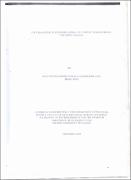| dc.description.abstract | This research is concerned with the challenge of religious appeal to conflict resolution process in Northen uganda, The purpose of the study was to investigate [he notion of religion in conflict resolution with specific emphasis on: (i) how the LRA conflict is
inclined to religion (ii) how religion has empowered individuals to denounce the conflict (iii) the role religious institutions have played in the resolution of the conflict. This study was guided by three research questions each relating to the above specific objective respectively. The study concentrated on the activities of ARLPI and lRCU from 1998- 2007. Five (5) districts of northern Uganda were selected for this study. thirty (30) respondents were chosen by use of systematic sampling technique which involved; Bishops, District Qadis', Imams. Pastors and FBO employees. Simple descriptive analysis wa used to analyze the qualitative data, while descriptive statistics in percentages was employed for quantitative analysis. Then nonparametric was used to design the questionnaires. The research findings indicated that the LRA conflict is specifically linked to the catholic faith. This is as a result of the strong historical attachments Acholi community has with the catholic faith, the influence of Acholi
ethnicity and the myth that" Acholi are God' hosen people to rule Uganda" .The religious appeal has significantly contributed to peace in the region by altering the attitude of the disputants, this is done through community peace prayers. Preaching peace and rehabilitation of the defect ants. Religious organizations play big role of mediation, advocacy, lobbying for amnesty bills and sensitization .They also inform the international community about the plight of the region amidst the conflict. The research
recommended the following:(i) religious leaders and institutions should continue to persuade both parties to end the violence (ii) FBOs should continue to formulate common positions to pressure both sides to adopt peaceful means to end the war (iii)the traditional methods of reconciliation and peace building must be encouraged among the communities in the region. Therefore religious appeal for peace should be given priority by the national and international stake holders till peace is completely attained. | en_US |

